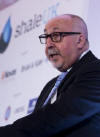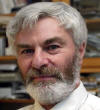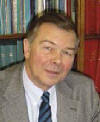The insolence of office
[Originally written in 2014-15, updated in 2021, mainly to update or remove broken links]This page is about some expert earth scientists who seem to have compromised their skills and experience in the service of government or industry. In the list we find senior earth science researchers who have justly won their positions in academia, who have received prizes awarded by their peers, and who may then be invited to serve on government committees - but then become lazy in their pronouncements and judgment, assuming that their academic credentials can substitute for facts, meticulous research and clear thinking. It's as if some of them leave their critical faculties outside the door of the committee room.
Some academics have industrial links which might not be properly disclosed. There is nothing wrong in principle with industry-university links, including research project funding by industry. But once in receipt of such funds, it can be very difficult for a researcher to criticise either the funding organisation or even the industry in general. He who pays the piper calls the tune. This restriction equally applies to government-funded research, such as that carried out by the British Geological Survey, for which I worked for fourteen years. There can be a conflict of interest between open academic or professional disclosure and the commercial or political aims of business or government.
The public is often unaware that research contracts between industry and universities normally have restrictive clauses about publication rights. One of the reasons given is that the funder may wish to safeguard intellectual property rights. Commercially valuable data generated by means of a research consortium are often kept confidential for a number of years, although the scientists involved normally get permission to publish papers referring to the data. This may seem reasonable, but it does mean that such peer-reviewed research cannot subsequently be challenged, because the underlying database remains confidential.
I am pleased to note that two of the researchers listed here, Professors Davies and Styles, appear in the last decade to have shifted their stance from being in favour of fracking (or at least being uncritical) to being much more critical. However, I have no evidence that Fisher, Oxburgh, Riley, Rutter, Shipton and Verdon, supporters of (or at least favourable to the development of) fracking in the UK a decade ago, have subsequently changed their views - but I would be delighted to be proved wrong. Three persons listed here, Messrs. Verdon, Yardley and Younger, have specialised in ad hominem attacks.For the record, here is an account of my own past links to government and industry. I declare that I have no conflicts of interest.
The comments here are complemented by some of a more ephemeral or topical nature in my blog (now archived), frackland.
Professor Richard Davies
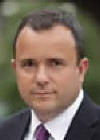
His profile as given by Newcastle University states:
"Professor Davies took up the post of Pro-Vice-Chancellor (Engagement & Internationalisation) in August 2014. He is a petroleum geologist, who started his career with various postings in the UK and abroad in the oil and gas industry, mainly with ExxonMobil. He has developed an international reputation for the understanding of how sedimentary strata on earth form and how geological fluids (eg oil, gas, water) flow through them. Most recently he has applied this knowledge to the debate on the use of hydraulic fracturing technology (fracking) for the extraction of hydrocarbons."
He was the founder and first Director of the Durham Energy Institute at Durham University, where he worked before moving to Newcastle. He remained the project leader of the ReFINE (an inter-institutional fracking research consortium), the web page of which stated:
"In the UK, Richard is an advisor to the All Party Parliamentary Group on Unconventional Oil and Gas. He is agnostic about the issue of shale gas and oil exploitation but very outspoken about his commitment to expanding the evidence base in the European fracking debate."
In 2012 Professor Davies published a paper uncritically quoting results from the USA (itself published with sparse geological details by petroleum engineers employed by Pinnacle, a Halliburton subsidiary) which imples that leakage via faults to the surface of fracking fluids and gases is not a problem. However, there were signs that he was more circumspect about shale gas exploitation than some of his academic colleagues listed here; he was the only academic who ever took the trouble to ask me about my views on faulting in relation to fracking.
So he did appear to wish to understand the arguments against as well as for fracking. In a telephone conversation in late 2014 he cited some convincing (but confidential) evidence that the ReFINE research group was not in the pockets of the industry, even though it was industry-funded. One year later he published (with Liam Herringshaw) a short case study How should fracking research be funded?. They noted that Total had withdrawn its funding from ReFINE shortly after the group had published a paper pointing out possible failures of integrity of fracked wells (i.e. that they can leak). No link between the publication of the latter paper and Total's funding withdrawal was admitted, but the suspicion remained that Total had objected to the paper from the ReFINE group that was critical of fracking.
The last published activity of the ReFINE research group seems to have been in 2019, but the link to its site is no longer functional (as of 2021), suggesting that the consortium has been disbanded.
Gang of fifty
The title refers to a letter published in The Guardian in June 2014, signed by fifty academics with Professor Richard Selley at the head, who wrote:
"as geoscientists and petroleum engineers from Britain's leading academic institutions, we call on all politicians and decision-makers at all levels to put aside their political differences and focus on the undeniable economic, environmental and national security benefits on offer to the UK from the responsible development of natural gas from Lancashire's shale."
Three replies were published together a few days later, one of them being from me. Here are two extracts pertinent to the subject of this page:
"...Selley has been trawling the email lists of university earth science departments for months now, sending repeated messages looking for support. It seems only 50 have signed up. Perhaps other geoscientists see things differently. I certainly do.
Tim Atkinson
Professor of environmental geoscience, University College London"
"More pertinent than the possible "directorships and other commercial interests" (Letters, 6 June 2014) of the 50 academics who signed the pro-fracking letter is the insidious influence of oil industry funding. Of the 21 university departments to which the academics belong, at least 15 are in receipt of research funds from the oil industry. Unfortunately, the days of academic independence are over.
David Smythe"
One large earth science department is notable for its lack of signatories to the letter - Cambridge; two other departments of that calibre, Edinburgh and Oxford, each only produced one signatory. By 'large' I mean departments with more than 30 or 40 academic faculty and research staff. As The Guardian put it in its online picture caption, "there is no consensus in academia behind exploitation of shale gas".
TalkFracking revealed in a report written for it by Paul Mobbs (published in March 2015) that the letter "was co-ordinated by the North West Energy Task Force, a coalition of over 300 businesses, economists, academics and local communities. The Task Force is supported by both Centrica Energy and Cuadrilla Resources". Mobbs showed by the logical errors it contains, and by its bias towards economics rather than science, that the letter is an example of astroturfing - fake grassroots organisations run by industry for its own benefit.
In my view the academic signatories, purporting to be 'grassroots' in astroturf parlance, are politically naïve in allowing themselves to be used in this way. They would do better sticking to their expertise in geology and geophysics.
Professor Quentin Fisher
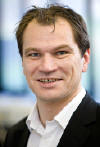
Quentin Fisher obtained a PhD in low temperature geochemistry in 1993. He then spent around 15 years working as a consultant on fault sealing in petroleum reservoirs. During this time he collected a huge database on the single and multiphase flow properties of fault rocks. In 2008 he became Professor of Petroleum Geoengineering and Research Director for the Centre for Integrated Petroleum Engineering and Geoscience. His main research interests include, faulting and fluid flow, and petrophysical properties of low permeability rocks.
In a Research Excellence Framework document of 2014 he claims that his research into faults has "dramatically increased the ability of the petroleum industry to predict the impact of faults on fluid flow in petroleum reservoirs. Well done Quentin!
Professor Fisher's public comments since 2012 about fracking being safe are hardly surprising, given that his livelihood since 1993 has depended almost entirely on fossil-fuel industry funding. He clearly knows that faults are often conduits for fluid flow. The precautionary principle suggests that fracking should not take place in faulted basins. But perhaps Professor Fisher is unable to make the connection between his fault expertise, acquired in the realm of conventional petroleum exploration, and unconventional methods, where the normal rules of source, reservoir and trap do not apply.
Geological Society of London
Edmund NicklessIn spite of its stated view to remain neutral about the problem of nuclear waste disposal in the UK and about development of shale gas, it appears that the Geological Society is working behind the scenes to promote DECC's interests. Here are two examples.
The West Cumbria Managing Radioactive Waste Safely (MRWS) partnership requested a meeting with the Geological Society, after the latter had responded to the recently completed consultation exercise. The meeting took place at Burlington House on 19 June 2012. I questioned why the MRWS referred to the minute of this meeting as the 'view of the Society', when the only three Fellows present as experts were all associated with the BGS: Professor Peter Styles (Keele University and Board member of BGS); Dr Richard Shaw and Mr Andrew Bloodworth (both BGS employees). This is far from being a representative cross-section of your membership, but, on the contrary, it is a cherry-picked sample of the Society's membership.
I asked Edmund Nickless, Executive Secretary of the Society, about the origins and membership of the "informal contact group" dealing with radwaste issues, and why the experts were all BGS-associated. His responses were somewhat evasive, but he did state that "Fellows who take part in briefing meetings such as that held with representatives of the West Cumbria MRWS Partnership in June do so in a personal capacity." This corroborated the MRWS response to my specific question, about whether or not the two BGS officers were there in a personal capacity or not. But the NERC response to the same question, which I take to be the correct one, is that their travel and subsistence were paid by NERC. They were therefore present in an official capacity; the Society's position is incorrect.
Edmund Nickless is far too astute an administrator (his career in a nutshell: BGS to NERC HQ to Cabinet Office to Geol Soc) to have overlooked the fact that his three-man 'expert group' on the occasion in question was none other than the BGS speaking; this was no accident of availability of Fellows (members). I know from my 14 years with the BGS that its officers are not permitted to speak publicly against government policy; therefore it is simply not possible for Dr Shaw, for example, as head of the radwaste group in the BGS, to speak on that subject in a 'personal' capacity.
The conclusion is inescapable - that the Society was used as a supposedly disinterested front for the BGS to promote its view (which is necessarily aligned with DECC's). So the supposed considered view of the 'Geological Society of London', supplied to MRWS, and explicitly aimed at counteracting the very detailed evidence produced for MRWS by Professor Stuart Haszeldine and myself, arguing that West Cumbria is in its entirety unsuitable for radwaste disposal, was nothing more than an assertion by three individuals doing the bidding of DECC that West Cumbria could not be ruled out.
In the eyes of the public the geological arguments about West Cumbria then became the 'majority of geoscientists' (thanks to the Society's ill-advised intervention) versus two maverick professors, implying that there had been some detailed scientific debate - but there had not.
This sort of nonsense - public briefings by shadowy, anonymous and unaccountable "informal contact groups" and so on, is not science, but pure politicking. No attempt at detailed refutation of any of the geological evidence put forward by Professor Stuart Haszeldine and me has ever been presented. My own consultation response, submitted in March 2012, runs to some 168 pages of single-spaced text, including 70 diagrams. To this day I await a refutation of any part of it. If the Society wishes to support government policy in an open and honest manner then it could have organised an open Burlington House meeting (like the January 2006 event) at which such issues could be aired.
In January 2014 I had two phone conversations with representatives of Global Event Partners, a company organising a two-day shale conference 'sponsored by the Geological Society' held in March this year. In one of these Rob Percival, GEP's director, told me that DECC had commissioned this meeting from the Society.
My understanding of meetings normally organised by or on behalf of the Society is that a known group of Fellows advertises the proposed event on its website, calling for papers. The cost of attending is of the order of £150 per day. The papers read at the meeting or conference are duly published, usually in a Special Issue. This is one of the laudable ways in which the Society furthers earth science.
But in contrast to the normal Geological Society conference procedure, the 2014 shale conference organisation and outcome was as follows:
- Attendance fee c. £550 (incl. VAT) per day.
- No public information about organising committee.
- Nothing has been published subsequently, and
- Presentations remain under restricted access.
Another such conference was planned for 2015. This is neither science nor education, as I understand it; these shale 'conferences' are nothing but a money-making game for somebody (roughly £200K gross per conference) as well as being a clandestine means of backing and publicising government policy. There is little or no science involved. The whole tenor of the last conference was concerned with promoting shale gas operations in the UK. This is incompatible with the Society's position statement on shale fracking, in which it claims to be neutral.
Has the Society forgotten its motto "serving science and profession", or is it now tarnishing its good reputation by lending its name to such affairs?
Professor Rebecca Lunn
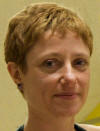
The Committee on Radioactive Waste Management (CoRWM-3) management annual report for 2013-14 stated:
"Rebecca Lunn is a Professor in Civil Engineering at the University of Strathclyde. She has over 20 years of research experience in hydrogeology, with a particular focus on deep flow systems, hydromechanics and the spatial and temporal evolution of rock permeability. In 2011, she was awarded the Geological Society Aberconway Medal for research of particular relevance within industry. Her research experience is multi-disciplinary and she currently collaborates closely with structural geologists, seismologists, mathematicians, microbiologists, psychologists and statisticians. ... Current research interests include: new monitoring technologies for nuclear waste disposal and geological carbon storage sites; design of novel grouts for injection as ground barriers and for sealing fractures in rocks; and exploring public understanding of science ..."She joined CoRWM in 2009 and demitted office in October 2014.
The Cumbria Trust (CT) is a group campaigning against the construction of a radwaste repository in West Cumbria. It is chaired by Eddie Martin, former leader of Cumbria County Council (CCC). It was under his chairmanship that CCC decided in January 2013 not to proceed further with progress towards siting a repository. Its primary grounds for withdrawal were (a) lack of a democratic mandate, and (b) unsuitable geology.
Professor Lunn gave a lecture to the Geological Society of London in March 2014, entitled "Meeting the challenge: Geological disposal of UK higher activity radioactive waste". The video of the lecture and a pdf of the slides have been made available on the CoRWM website, and can therefore be taken as representing CoRWM's view.
The CT pointed out that in discussing the failed Managing Radioactive Waste Safely (MRWS) process in West Cumbria Professor Lunn completely misquoted the level of support for a local radwaste site, stating (in slide 31): "Previous process failed to find a site, despite substantial >80% support". The true figures were 68% in Copeland and 51% in Allerdale. However, 80% of those questioned in the MORI poll (called by her the Moray poll - slide 19) admitted to knowing little or nothing of the process about which they were answering questions. In other words the MRWS consultation was a failure.
So despite being a CoRWM member during the whole period of the West Cumbrian - MRWS partnership, she could not get these few simple statistics correct.
In commenting on the geological evidence presented for 'campaigners' she cited two geologists (one of whom was clearly myself, and the other was presumably Professor Stuart Haszeldine), stating that we presented "misleading and simplistic arguments about groundwater flow". Firstly, she presented a simplified slide (no. 21) taken from an early non-technical slideshow of mine intended for the general public (but which is, nevertheless, essentially correct). She implied that our safety case against West Cumbria was based on little more than that. She then added the Lake District Boundary Fault to the diagram (slide 22), and went on to explain that this fault would divert all the flow from the mountains:
"faults are well known to divert flow; at the very least, they'll divert it, and have some kind of cracking along the sides which will tend to channel it, but most likely, they'll just be a complete barrier to flow".
This explanation revealed her ignorance of the hydrogeological work carried out by Nirex in the 1990s, to say nothing of my detailed critiques of Nirex's fluid flow modelling. Almost all the flow to the west in my simplified diagram originates from recharge at the surface west of the boundary fault, so, If Professor Lunn wished to add the fault to the diagram it should have been placed at the very eastern edge; in addition it dips west, not east, as she drew it.
On the technical issues in the same talk, she failed to mention the serious problems with the Swedish KBS-3 copper canister (slide 14), claiming that it will be safe for one million years (slide 15).
In conclusion, Professor Lunn's lecture betrayed either an inadequate grasp of the geological and engineering issues of radwaste disposal, both in West Cumbria and elsewhere, or else it demonstrated a determination on her part to downplay all the problems. CoRWM can only be better off without her (she stepped down at the end of October 2014), and it would be wise of the committee to remove the links to her lecture.
In March 2015 Professor Lunn was quoted in The Times as saying that the Scottish government had ignored advice from scientific institutions as well as its own working group by declaring a moratorium on fracking, despite evidence that, if properly regulated, it posed little environmental risk. "It's an extremely ill-informed debate. ... They've been fracking in the US for 50 years, and until recently nobody noticed."
In my view her statement about fracking having been in existence for 50 years (it is actually more like 80 years if you include its ugly sister acidisation, understood by the industry to be a form of fracking) is an excellent example of an "ill-informed" contribution to the debate. She fails to recognise the enormous difference between the early, low water volume fracking of vertical wells and the modern slickwater, high-volume 'super-fracking' of extended horizontal wells in shale, which is environmentally contentious.
Outer Limits
Outer Limits Geophysics LLC was created in 2014. I discuss it here because it is a consultancy vehicle run by Bristol University academics James Verdon and John-Michael Kendall. The latter has since moved to Oxford University. A third director, Andrew Verdon, ex-RAF, appears to be the company manager, and is not a geophysicist. Outer Limits Geophysics is still active. A sister company, Outer Limits Geosciences LLC, was also registered to the same address of Andrew Verdon. It had two additional directors, Anna Stork and Anthony Butcher, also Bristol researchers. It was incorporated in December 2016 and dissolved in October 2020. Here is a list of the net annual profits from these two consultancies:| Company | Year | Profit |
|---|---|---|
| Outer Limits Geophysics | 2014-15 | £71561 | Outer Limits Geophysics | 2015-16 | £70695 | Outer Limits Geophysics | 2016-17 | £54990 | Outer Limits Geophysics | 2017-18 | £42118 | Outer Limits Geophysics | 2018-19 | £46184 | Outer Limits Geophysics | 2019-20 | £71457 | Outer Limits Geosciences | 2016-18 | £378738 | Outer Limits Geosciences | 2018-19 | £9222 | Total for both companies | 2014-20 | £744965 |
Lord (Ron) Oxburgh
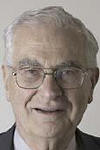
I knew Ron Oxburgh slightly in the 1980s when I spent regular sabbaticals at Cambridge University, where he was chair of Earth Sciences. I roomed with him on the last two nights of a geological field trip to Nevada in 1985; there he asked me for something to read on the plane home. I was able to give him my copy of Changing Places by David Lodge; apposite, in view of his subsequent career.
Ron wrote a seminal paper with Don Turcotte in 1967 which helped to found the new science of plate tectonics. From Oxford, Princeton and Cambridge Universities, Ron has since ascended the heights of British establishment, to become a member of the House of Lords. He is undoubtedly the Upper House's most eminent (and probably only) earth scientist.
Lord Oxburgh chaired the House of Lords Science and Technology Committee on radioactive waste management, whose report was published in December 2004. The report was scathing of CoRWM (CoRWM-1), in part because CoRWM had no earth scientists among its members. Nevertheless CoRWM-1 recommended geological disposal of radwaste in its final report of 2006.
Lord Oxburgh also sat on the 2010 committee updating radwaste management progress. The purpose of this committee was to assess the reconstituted CoRWM (CoRWM-2). At that time only one so-called 'community' had volunteered to host a radwaste disposal site - West Cumbria. Professor Pickard, chair of CoRWM-2, stated in evidence to the committee that "it would have been helpful if there had been more than one region showing an interest." CoRWM-2 now had three earth scientists on its committee of fifteen members.
What surprises me about the committee's 2010 report is that, although there was a cursory mention of the Nirex public inquiry of 1997, there was never any suggestion that West Cumbria might be intrinsically unsuitable for radwaste disposal. In my view this was a failure by Lord Oxburgh, or at least a missed opportunity, to ask the broader question - what if the geology of West Cumbria is simply not amenable to the construction of a safe disposal site?
In late 2013 I wrote to Lord Oxburgh with a copy of my submission to the DECC consultation: Review of the Siting Process for a Geological Disposal Facility, appealing for his aid in trying to bring some science back into the siting process. He did not reply. I am disappointed that Lord Oxburgh does not seem to have intervened more in the issue of UK radwaste disposal, but perhaps I am expecting too much of him, either personally, or of House of Lords committees in general.
I am also disappointed that Lord Oxburgh, despite being an advocate of measures to combat global warming such as carbon capture and storage, lent his name to a 'Shale UK' conference held in March 2014, at which he gave the keynote speech. Although this conference was held under the aegis of the Geological Society of London, it appears to have been little more than a promotional exercise on behalf of DECC and the hydrocarbon industry. Presentations and papers from this meeting remain confidential.
Dr Nick Riley
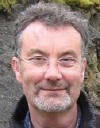 Nick Riley was formerly Team Leader for Unconventional Gas
at the British Geological Survey (BGS) and
directs his own company Carboniferous Ltd, founded in 2013 and based in Nottingham. He became an
international expert on Carboniferous rocks during his 33 year career with the BGS. In 2003 he was awarded an MBE for "Services to UK Geoscience".
While at the BGS he was contracted by Cuadrilla Resources Ltd to study the
cores taken from the Preese Hall-1 well in Lancashire, drilled in 2011. This
confidential report from 2012 was later released along with the well logs.
The report is typical of the commercial links between the BGS and the oil
industry.
Dr Riley takes a Panglossian view of shale gas development: the technology is
environmentally harmless; the UK needs shale gas as a bridge energy on the way
to the future of renewable energy; shale gas will reduce the UK's dependence
on imported gas; gas burning can be mitigated by carbon capture and storage (CSS);
and the UK's regulatory regime is far more robust than in the USA.
I do not share any of these opinions. In his capacity as a geologist he does not offer any novel or original analysis of UK shale basins.
The several flawed or misleading statements by Dr Riley
concerning shale gas and oil development are discussed in my blog
frackland.
Nick Riley was formerly Team Leader for Unconventional Gas
at the British Geological Survey (BGS) and
directs his own company Carboniferous Ltd, founded in 2013 and based in Nottingham. He became an
international expert on Carboniferous rocks during his 33 year career with the BGS. In 2003 he was awarded an MBE for "Services to UK Geoscience".
While at the BGS he was contracted by Cuadrilla Resources Ltd to study the
cores taken from the Preese Hall-1 well in Lancashire, drilled in 2011. This
confidential report from 2012 was later released along with the well logs.
The report is typical of the commercial links between the BGS and the oil
industry.
Dr Riley takes a Panglossian view of shale gas development: the technology is
environmentally harmless; the UK needs shale gas as a bridge energy on the way
to the future of renewable energy; shale gas will reduce the UK's dependence
on imported gas; gas burning can be mitigated by carbon capture and storage (CSS);
and the UK's regulatory regime is far more robust than in the USA.
I do not share any of these opinions. In his capacity as a geologist he does not offer any novel or original analysis of UK shale basins.
The several flawed or misleading statements by Dr Riley
concerning shale gas and oil development are discussed in my blog
frackland.
Professor Ernest Rutter
Ernie Rutter is Emeritus Professor of Structural Geology at the University of Manchester. He is an expert on the folding and faulting of rocks, the formation of sedimentary basins and mountains, and the physical properties of rock. I find it all the more astonishing then, given his expertise, that he has not mentioned in public the likelihood of faults being pathways for fluids during or after the fracking phase of unconventional gas or oil production. In two newspaper articles and a BBC broadcast of July 2014 he agreed uncritically with the government and industry line on various issues. He finished the broadcast interview by saying:"I believe that that the country comes first, and as Francis* has pointed out, it is very important that the principal beneficiary, UK PLC, should receive the benefit from development of a shale gas industry, so how can I possibly object to having fracking activity at the bottom of my garden?"
* Francis Egan, CEO of Cuadrilla Resources, was the other expert interviewed on the programme - hardly the balance of pro- and anti- that the BBC normally insists upon.
In 2011 Professor Rutter conducted laboratory experiments for Stratagen, a company which had been commissioned by Cuadrilla Resources to investigate the seismicity at the Preese Hall-1 well. This was the Cuadrilla borehole which triggered a series of small earthquakes in 2011 during the fracking process. He has therefore been a Cuadrilla subcontractor. This is a possible conflict of interest if and when he is ever asked to speak about fracking. This interest was not declared in the BBC broadcast.
I remember Ernie from nearly four decades ago as a likeable and competent geologist. I was sorry to see and hear that his critical faculties and political acumen, as evidenced by the broadcast and newspaper interviews quoted above, are wanting. A detailed critique of his public pronouncements is here; in addition, his opinions on the lack of health risk from US fracking experience are unfounded.
In October 2014 Professor Rutter was appointed to the panel of the Task Force on Shale Gas, an industry-funded but supposedly independent advisory group chaired by Lord Chris Smith. According to DeSmog UK Rutter is paid �800 per day for one day per month serving on this panel.
Professor Richard Selley
Richard (Dick) Selley, Emeritus Professor at Imperial College, is the doyen of shale hydrocarbon prospectivity in the onshore UK scene. He was a member of the joint Royal Society / Royal Academy of Engineering working group which produced the report on hydraulic fracturing published in 2012.
He was asked by the South Downs National Park Authority in June 2014 to comment upon Celtique Energie's application to drill at Fernhurst, within the national park. He did not respond directly to simple questions put to him by the SDNPA. In addition he got his facts wrong on the basic details of the geology, because he discussed the drilling targets incorrectly. I felt obliged to respond to the SDNPA to correct his errors and omissions.
In September 2014 the SDNPA refused Celtique's planning application.
Dr Richard Shaw
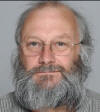
Richard Shaw was Leader of the Radioactive Waste Team at the British Geological Survey. He was also the coordinator of a major European Union project, FORGE, researching the gases that would escape from an underground radwaste repository. His background is in mining geology (BSc) and his PhD research concerned ore minerals. He retired from the BGS in October 2016, but remained a member of CoRWM from 2016 to 2020.
I class him as a nuclear apologist, because even though he and his team are doing valuable research into radwaste disposal, his publications imply support for DECC's since-aborted proposals to site a nuclear waste repository in West Cumbria. The revival of the site search, focusing on West Cumbria, was a necessary component of the government's revival of nuclear power generation.
A joint BGS/Nirex statement, dated March 2006, amounting to one page of text, asserted that it can be concluded that rather more than the previously determined 30% proportion of the UK land mass would provide a potentially suitable geological setting for a repository. This statement became the sole geological justification for deep disposal quoted in the 2008 MRWS White Paper. The anticipated research report, which was due to be finalised by late 2006, was never published. Following a Freedom of Information request asking for copies of the map or maps upon which this assessment was based, it was claimed that such a map or maps do not exist. My reason for asking for the map was to determine whether the 30% of the UK land area quoted in the statement (a perfectly reasonable estimate in my view) included any or all of West Cumbria.
What has this got to do with Dr Shaw? In 2012 he was interviewed by BBC Radio Cumbria, alongside Professor Stuart Haszeldine, claiming that "the geology in West Cumbria offers potential to find a good site" (transcript). Such an assertion is pure advocacy and not based on any publicly available facts. On the contrary, it is at variance with the geology of West Cumbria, which I studied in exhaustive detail for this very purpose (i.e. the suitability or otherwise for radwaste disposal). I had written a lengthy paper and had submitted it to government the previous year, so Dr Shaw could hardly have been unaware of its contents.
In 2006 and in 2010 Dr Shaw published a hypothetical cross-section through a hard-rock mountain, purporting to show that such an environment could be "favourable" to safe radwaste disposal. I believe that this suggestion, which runs contrary to all international criteria for generic site selection, was a way of bringing either the Eskdale granite or the Ennerdale granite into consideration as a radwaste site in West Cumbria. The latter granite had been mentioned informally as a possible site, coupled to the untenable suggestion that development of the underground repository could be achieved by 10 km-long tunnels bored directly from Sellafield (or, more likely, from Longlands Farm). This slideshow demonstrates that the idea is ill-conceived. Apart from the serious geological shortcomings, Ennerdale would have to be taken out of the National Park, and parts of this beautiful landscape turned into a high-security industrial zone.
Professor Zoe Shipton
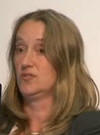
Zoe Shipton is Professor of Geological Engineering in the Department of Civil Engineering at Strathclyde University. Her departmental research profile describes some of her research areas as follows:
"1) How do faults act as high permeability conduits? Will this type of fault allow potentially undesirable fluids, for example contaminated water or CO2, to escape from geological storage sites? Many 'leaky' CO2 reservoirs are controlled by faults.2) Low permeability faults often produce hydrocarbon traps or barriers to fluid flow. What controls the distribution of structural elements in the faults, and how does each structural element contribute to overall fault zone permeability? Is there any scaling of fault elements that would allow us to predict fault zone properties in the subsurface?"
Given Professor Shipton's specific expertise and research interests in the importance of faults as fluid conduits, I find it all the more surprising that the Royal Society / Royal Academy of Engineering report of 2012 into shale gas extraction, of which she was a co-author, barely touched upon faults as potential conduits for contamination of the surface and of aquifers.
Professor Peter Styles
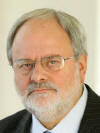
Peter Styles is a geophysicist, formerly at Liverpool University and now Emeritus Professor of Applied and Environmental Geophysics at the University of Keele. He has either chaired or sat on a number of government committees, and was on the Board of the British Geological Survey (now replaced by an Advisory Committee).
Peter Styles was on the expert advisory group of Shale Gas Europe, a now-defunct industry PR front run by lobbyists FTI Consulting and funded by Chevron, Cuadrilla, Halliburton, Shell, Statoil and Total.
Styles gave a presentation to the South Downs National Park Authority in October 2013. I included a detailed critique of his presentation in my submission to the Fernhurst planning application consultation. Here is my critique in stand-alone form. He repeated the misleading claim, first employed in the 2012 Royal Society report, that c. 200 fracking operations had already been completed in the onshore UK; it was misleading, because:
Ms Toni Harvey of DECC confirmed these facts, which were published with a commentary
by refracktion.com (site since taken down) on 23 August 2013. Why did Styles not retract his error before his presentation two months later?
Only one shale well had been fracked to date (Preese Hall-1 in Lancashire),
not the 200 claimed.
Dr James Verdon
James Verdon is a lecturer at Bristol University. Prior to that he was funded from September 2011 by a NERC research scholarship running for three years. He was on Twitter as @TheFracDoctor, and ran a blog, frack-land.
In 2012 Verdon posted a 1 minute 40 second video about fracking, in which he made several serious errors; he seemed to have a limited understanding both of the mechanical properties of shale and of UK geology (details here). The BUMPS (Bristol University Microseismicity Research ProjectS) research project was originally 100% industry funded, but the four current sponsors (as of 2019) now include the Oil and Gas Authority. Verdon is particularly close to Cuadrilla, and BUMPS set up a microseismic array at Balcombe in 2013.
More details of Dr Verdon's numerous misconceptions and biased reporting of fracking are supplied in my own blog (now archived) Frackland.
In his blog entry dated 1 August 2014 he reproduced some of the offensive and defamatory material from The Times of the same date, but went even further by adding his own ad hominem comments. The only useful section in this piece is his discussion of how to track the progress of horizontal drilling in 'real time', that is, as it proceeds.
In late 2017 (after my separate court case against the University of Glasgow had been resolved) I asked my lawyer to write to Verdon demanding that the offensive web page be deleted. She wrote:
"I act on behalf of David Smythe, Emeritus Professor of Geophysics, University of Glasgow. I refer specifically to an update of 1 August 2014 to your blog dated 3 September 2013, together with your main blog dated 1 August 2014 about my client.In the latter you reproduce a quotation made by Professor Paul Younger in the Times and other newspapers dated 1 August 2014. Since his assertion "He falsely claims to be a chartered geologist. That's fraudulent. It's wilful untruth" is untrue and defamatory, your repetition of the defamation is also defamatory. I therefore ask you to remove it. For the avoidance of doubt, my client has never claimed since 1996 to be a Chartered Geologist. However, he correctly claimed, in two proofs of evidence submitted to the Falkirk Coalbed Methane planning inquiry of 2014, that he was qualified as a Chartered Geologist. He was made a Chartered Geologist in 1990 on the inception of the title. Since 1996 he has never put the postnominal CGeol after his name.
Your first paragraph, as amended, concerning the closure of the Department of Geology & Applied Geology is incorrect. The department was closed, period. The means by which you use strike-through is designed to falsely belittle the good reputation of my client. This must be removed.
The comment dated 21 August 2014, signed 'Anonymous', is particularly offensive and defamatory. You alone are responsible for it. It includes the following: [defamatory comment omitted] ...
It is difficult to understand why you did not moderate this comment as soon as it came in, by simply removing it. It is evidently a complete fabrication, not least because it suggests that my client taught second year classes in geology. My client in fact taught first, third and fourth year classes, but never second year. ...
Your blog is run independently of the University of Bristol, but you are clearly identifiable as a research scientist of the University. Given that your offensive and defamatory comments about a fellow geophysicist risk bringing your current employer into disrepute by your reckless disregard both for facts and for the finer points of scientific discourse, I am copying this letter to your Vice-Chancellor, Professor Hugh Brady, in the hope that he may persuade you to moderate your blog, even though it is notionally independent of the University."
In response, Verdon wrote back using his University affiliation to say that the blog article had since been removed.I imagine that his Bristol employer will have recorded a black mark on his personnel file.
However, the defamation incident should not be the only black mark on his file. The lawyer's letter continued: "You have also been contracted from time to time to the UK onshore oil industry. You should have declared this potential conflict of interest whenever you publish any research on the question of fracking. But my client notes that in your latest paper on the subject (in Geophysical Prospecting, online 20 October 2017) you have failed to acknowledge your (presumably) pecuniary interest in having been contracted to Third Energy UK Gas Ltd in connection with its fracking site KM-8 in North Yorkshire between 2015 and 2017. Given the importance of academics researching in the contentious field of fracking being seen to be transparent about their potential conflicts of interest, this is a serious concern, which my client will be addressing elsewhere." Verdon, who has earned a considerable sum over the last seven or eight years as an industry consultant (see Outer Limits above) has failed to declare his pecuniary interest in at least one other academic paper. It is a pity that a once promising scientist like James Verdon is not living up to the scrupulous and objective research standards that formerly made UK earth science a world leader.Professor Bruce Yardley
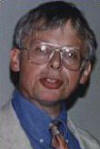 In December 2012 a new name entered the UK radwaste
debate - Bruce Yardley, Professor of Metamorphic Geochemistry at Leeds University. During
his 40-year long career in academia, he had lately diversified into more
applied geological research than his speciality of fluids in the Earth's crust, but his only prior engagement in the
radioactive waste disposal area was in helping to organise two meetings on the topic
hosted by the Geological Society.
He was a director of Rock Deformation Research Ltd from 2002 until 2014. This appears to be a spin-off R&D company of the University of Leeds, with the shares held by the University. In the early years turnover was of the order of £1M, and the company employed about 20 people. In 2005, for example, the four directors, including Yardley, were paid about £120K in total (it is not disclosed how much of this went to Yardley).
In December 2012 Professor Yardley gave evidence to a fact-finding select committee of Cumbrian MPs, just one month before the vote
at which Cumbria County Council decided to pull out of the Managing
Radioactive Waste Safely process. Written evidence also
came from Dr Bruce McKirdy of the Nuclear Decommissioning Agency,
Professor Stuart Haszeldine
(Edinburgh University) and me (all collated here,
with my comments on McKirdy and Yardley here). Yardley had never previously made any submissions to the several DECC consultations over the preceding years.
Stuart Haszeldine and I have been involved in the UK radwaste debate for over 25
years. We know most of the people and companies involved. It's
not really a very large group of researchers, comprising less than a
dozen active individuals, of which Yardley was not part until December
2012.
Nevertheless, Yardley then went on to criticise Stuart Haszeldine
and me in a Geological Society magazine article in April 2013, claiming that we were mere "campaigners" and not proper scientists. Our response was published in December 2013 in the same magazine. I also added some supplementary comments which expose the depths of his ignorance.
He was appointed to the new role of Chief Geologist at the Radioactive Waste Management Direcorate in 2014, as I predicted earlier that year, but resigned three years later.
The danger of people like Professor Yardley does not lie
in his gratuitous ad hominem insults. It is that he pontificates
upon a subject of which he has barely even skimmed the surface. His job title
gives him some status, which is no doubt justified in his own speciality, but
which he then uses to speak out without having done his homework; and of course
when he pronounces that 'we need to do more research' or 'the risks are
infinitesimally small' - just the kind of thing DECC wanted to hear regarding West
Cumbria - then he becomes an important figure in the debate.
In December 2012 a new name entered the UK radwaste
debate - Bruce Yardley, Professor of Metamorphic Geochemistry at Leeds University. During
his 40-year long career in academia, he had lately diversified into more
applied geological research than his speciality of fluids in the Earth's crust, but his only prior engagement in the
radioactive waste disposal area was in helping to organise two meetings on the topic
hosted by the Geological Society.
He was a director of Rock Deformation Research Ltd from 2002 until 2014. This appears to be a spin-off R&D company of the University of Leeds, with the shares held by the University. In the early years turnover was of the order of £1M, and the company employed about 20 people. In 2005, for example, the four directors, including Yardley, were paid about £120K in total (it is not disclosed how much of this went to Yardley).
In December 2012 Professor Yardley gave evidence to a fact-finding select committee of Cumbrian MPs, just one month before the vote
at which Cumbria County Council decided to pull out of the Managing
Radioactive Waste Safely process. Written evidence also
came from Dr Bruce McKirdy of the Nuclear Decommissioning Agency,
Professor Stuart Haszeldine
(Edinburgh University) and me (all collated here,
with my comments on McKirdy and Yardley here). Yardley had never previously made any submissions to the several DECC consultations over the preceding years.
Stuart Haszeldine and I have been involved in the UK radwaste debate for over 25
years. We know most of the people and companies involved. It's
not really a very large group of researchers, comprising less than a
dozen active individuals, of which Yardley was not part until December
2012.
Nevertheless, Yardley then went on to criticise Stuart Haszeldine
and me in a Geological Society magazine article in April 2013, claiming that we were mere "campaigners" and not proper scientists. Our response was published in December 2013 in the same magazine. I also added some supplementary comments which expose the depths of his ignorance.
He was appointed to the new role of Chief Geologist at the Radioactive Waste Management Direcorate in 2014, as I predicted earlier that year, but resigned three years later.
The danger of people like Professor Yardley does not lie
in his gratuitous ad hominem insults. It is that he pontificates
upon a subject of which he has barely even skimmed the surface. His job title
gives him some status, which is no doubt justified in his own speciality, but
which he then uses to speak out without having done his homework; and of course
when he pronounces that 'we need to do more research' or 'the risks are
infinitesimally small' - just the kind of thing DECC wanted to hear regarding West
Cumbria - then he becomes an important figure in the debate.
Professor Paul Younger
Why did I arouse his ire in August 2014, when he heard me on BBC Radio Scotland discussing the environmental risks of fracking? Within two hours he had sent me a highly abusive email, copied to the BBC, and was subsequently quoted in The Times as making defamatory, abusive and insulting comments about me. Here is a sample of what passed for academic discussion with him. I complained about his defamatory comments to the Secretary of the Court of the University of Glasgow, who eventually replied as follows:
"Your letter raised some serious concerns. You expressed a view that Professor Younger had initiated a campaign to vilify your reputation and you were concerned that the University was taking no steps to curb him. ... On the wider issue of Professor Younger's harsh word about you in the press, he assures me that he is not engaged in any continuing campaign and has no intention of making similar public comments in future. ... I have asked Professor Younger, and he has agreed, to desist from making any further public comments about you."
His main beef seemed to be that, as I am not a hydrogeologist, I have no authority to comment on fracking. On the contrary, my proven expertise in structural geology, tectonics, petroleum exploration, applied geophysics, and understanding of quantitative matters like fluid flow modelling, is all more relevant to the problems of both nuclear waste disposal and fracking than the geochemistry of groundwater per se, which is his speciality. His stance regarding my expertise was also inconsistent, because he himself felt free to comment in the press on wider matters such as economics of energy resources, which is very far from his own expertise of groundwater. Professor Younger seemed to be trying to marginalise or silence contrarian voices with an unjustified appeal to authority and gate-keeping, similar to the tactics used in demarcation disputes of old between rival trade unions. However, although I would have been happy to debate with him at any time, the opportunity never arose. After having been warned by his employer to desist from publicly criticising me, he developed a different tactic to try to silence me. Three days after I had published online a paper about fracking in early 2016, my university email address and access to the library system were terminated without warning. Younger had been trying to develop close links with Cuadrilla Resources Ltd, the company in the vanguard of UK fracking for oil and gas. Emails show that two Cuadrilla staff even flew to Glasgow for talks in June 2015. Cuadrilla may have been behind the request from Lancashire County Council to Paul Younger to review my detailed technical submissions to the council planning department. Younger had earlier written that their “Various industrial research partners” wanted the university to distance itself from my views. I took the University to court, helped by a CrowdJustice campaign, to restore my access rights. Following the first day in court, Glasgow University restored my access to essential online academic sources, and agreed to pay all my costs, some £12K. The Sheriff advised both parties to reach an amicable settlement. I was then able to donate the unused CrowdJustice fund residue, around £11K, to other similar causes. I had a productive informal meeting with the new Secretary of the University, Dr David Duncan, in October 2017. He told me that Professor Younger (a member of the University Court) had taken early retirement the previous March on ill-health grounds. Documents disclosed by FOI and a Subject Access Request show that it was Professor Younger who had instigated the moves between 2014 and early 2016 to have me isolated and cut off from university access. There was even talk of steps being taken to have my title revoked. Mr David Newall, the previous Secretary of the Court, who took the formal decision on behalf of the Court to have me terminated (but without the matter ever having been discussed at Court), had since left. In conclusion, a sorry tale of how the university management was taken in by a charming, and even charismatic figure, but who turned out to be a bluffer. Professor Younger was simply out of his depth in the field of fracking and hydrocarbon exploration, as I demonstrated in several Frackland posts. He also behaved in an underhand manner regarding his links to the fossil fuel industry.
